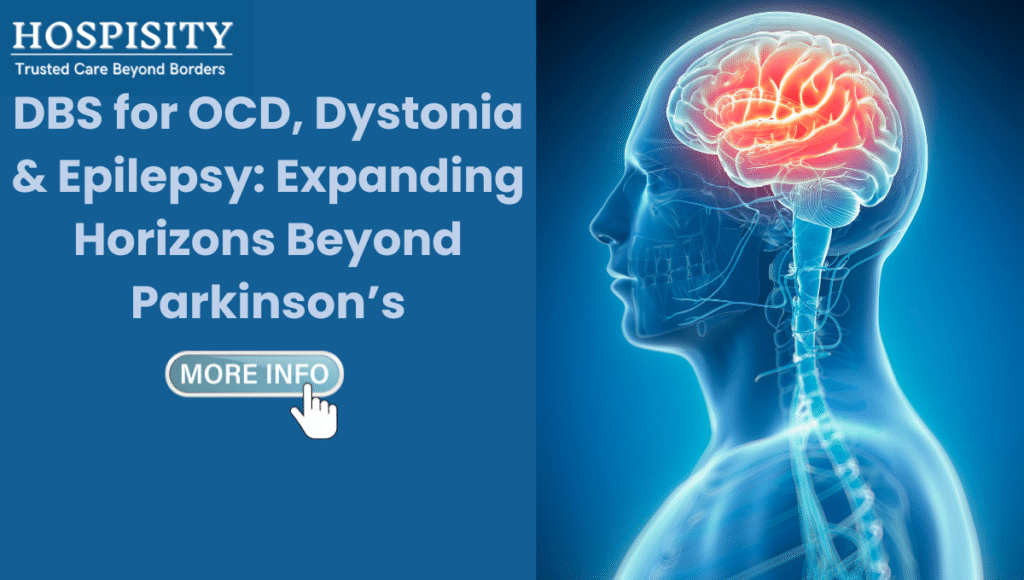DBS for OCD, Dystonia & Epilepsy: Expanding Horizons Beyond Parkinson’s

Deep Brain Stimulation (DBS) isn’t just for Parkinson’s anymore. In India, this cutting-edge neurosurgical treatment is making strides in managing Obsessive‑Compulsive Disorder (OCD), dystonia, and drug-resistant epilepsy, offering renewed hope to patients worldwide.
HOSPISITY connects international patients with India’s best-trained neurosurgeons and top-notch hospitals offering advanced technology, cost-effective care, and end-to-end support.
What is DBS & How Does It Work?
DBS involves surgically implanting electrodes into targeted brain regions. These electrodes connect to a pulse generator (similar to a pacemaker) implanted in the chest. Through electrical stimulation, DBS modulates abnormal brain signals to alleviate symptoms.
FDA approvals:
OCD (2009)
Dystonia (2003)
Epilepsy (2018)
DBS for OCD in India
Who’s a candidate?
Severe, treatment-resistant OCD
Medications and therapy have failed
Capable of adjusting stimulator settings
How it helps
Targets regions such as the nucleus accumbens to alleviate obsessive thoughts and compulsive behaviors.
Typical Cost
Base DBS package: INR 10 – 20 lakhs (~USD 12 000–24 000)
With rechargeable device: Up to INR 28 lakhs for premium implants
DBS for Dystonia in India
Candidacy:
Primary or generalized dystonia (including childhood-onset DYT1)
Severe symptoms despite medication
Benefits:
80–99% improvement in motor function for genetic dystonia
40–60% improvement in cervical dystonia
Cost:
INR 19.3 – 25.2 lakhs (~USD 23 000–30 000)
Find Out If You're Eligible for Non-Parkinson’s DBS Therapy
DBS for Epilepsy in India
- Similar range to other indications: INR 10–20 lakhs (~USD 12 000–24 000)
Candidacy:
- Drug-resistant epilepsy
- Not suitable for resective surgeries or vagus nerve stimulation
Target region:
- Anterior nucleus of thalamus, hippocampus
Outcomes:
- Over 50% decrease in seizure frequency
Cost:
Similar range to other indications: INR 10–20 lakhs (~USD 12 000–24 000)
- Similar range to other indications: INR 10–20 lakhs (~USD 12 000–24 000)
Pre‑ & Post‑Surgery Costs Overview (India)
| Procedure | Cost (INR/USD) |
|---|---|
| Pre-op Diagnostics & Psych Evaluation | ₹30 000 – 90 000 / $360–1 080 |
| DBS Device (Electrodes + IPG) | ₹5–10 lakhs / $6 000–12 000 |
| Surgery & Hospitalization | ₹1–2 lakhs / $1 200–2 400 |
| Post-op Programming/Follow-up | ₹3 000–15 000 per session / $36–180 |
| Rehab & Physiotherapy | ₹2 000–10 000 per session / $24–120 |
Advanced Technology & India’s Cost Advantage
Hybrid operating theatres with microelectrode recording & robotic assistance
Neuronavigation and 3D MRI/CT integration
Rechargeable pulse generators with 8‑15 year battery life
Cost savings of 60–70% vs US/UK DBS
Top Hospitals in India forNon‑Parkinson’s DBS
Fortis Hospital, Gurgaon
Fortis Escort Heart Institute, New Delhi
Medanta – The Medicity, Gurgaon
Max Super Speciality Hospital, Delhi
Artemis Hospital, Gurgaon
Shalby Sanar Hospital, Delhi NCR
Fortis Hospital, Bangalore
Jaslok Hospital, Mumbai
Indraprastha Apollo Hospital, Delhi
Manipal Hospital, Delhi
- These centers have neurosurgeons trained in DBS, equipped with advanced imaging and programmable devices.
Why Choose India for DBS Treatment?
Global neurosurgical expertise with international training
NABH & JCI-accredited hospitals
Cost-effective care saving 40–70% compared to Western countries
Fast scheduling, minimal wait time
Comprehensive concierge support from HOSPISITY (visa, lodging, transport)
FAQs- DBS for OCD, Dystonia & Epilepsy: Expanding Horizons Beyond Parkinson’s
Q1: How effective is DBS for OCD?
A: Studies show significant symptom improvement in treatment-resistant OCD patients, via stimulation of brain regions like the nucleus accumbens.
Q2: Is DBS reversible?
A: Yes, the device can be turned off or removed at any time.
Q3: Are there risks?
A: Possible complications include infection, bleeding, device displacement, and neuropsychiatric effects; but these are minimized in experienced centers.
Q4: How long does the device last?
A: Non-rechargeable batteries last 3–5 years, rechargeable models up to 15 years.
Final Thoughts
DBS is redefining treatment for OCD, dystonia, and epilepsy offering hope where conventional treatments fall short. India’s world-class hospitals, expert surgeons, and transparent costs make it a top choice for international patients.
Discover your eligibility and begin your transformative recovery journey with HOSPISITY.
